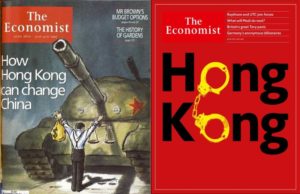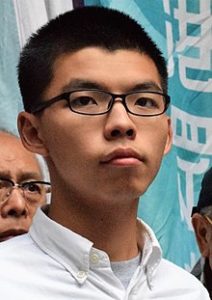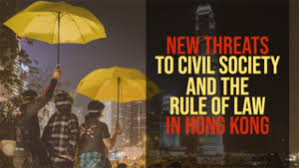
Pro-democracy unrest sweeping Hong Kong is threatening to tip the trading hub into recession for the first time since the global financial crisis a decade ago, as uncertainty grips an economy already buffeted by the U.S.-China trade war, The Wall Street Journal reports:
With a summer of protests showing no sign of abating, crucial industries such as tourism and retail sales are suffering as overseas visitors postpone trips and stores close amid violent conflicts. More ominously, anxiety about Hong Kong’s future risks crimping long-term investment decisions, experts say.
China’s ruling Communist Party has identified a novel reason for the current unrest in Hong Kong: the secret machinations of an American woman working as a diplomat in the United States Consulate. The woman, Julie Eadeh, a political counselor, has become a central figure in a growing Chinese narrative that Hong Kong’s protests are the work of traitors who are being directed by foreign, particularly American, “black hands” bent on fomenting an uprising in the former British colony, The New York Times reports:
Ta Kung Pao, a Hong Kong newspaper controlled by the Communist Party, published a photograph, taken on Tuesday, of the diplomat standing in the lobby of a luxury hotel with pro-democracy student leaders under the headline “Foreign Forces Intervene, Seek to Stir ‘Color Revolution.’” It said it had received the photo from unidentified patriotic “netizens.”….The belief that the State Department is coordinating and even orchestrating the Hong Kong protests feeds into a narrative that dates back to the Cold War, when the United States and the Soviet Union each sought to subvert the other’s ideology and its proxy states with spies and subterfuge.

Wikipedia
Joshua Wong (right), a pro-democracy student leader, scoffed at the reports of a conspiracy in a post on Facebook: “They are saying this again. The protesters can handle things like press conferences, which dirty cops and the chief executive cannot, so there must have been secret training!”
Mr. Wong, one of the protest leaders who was pictured meeting with Ms. Eadeh, said Friday that neither he nor his group receive any funding from the National Endowment for Democracy, or from the U.S. government. He added that it didn’t receive supplies or advice from the U.S. embassy, The Wall Street Journal adds.
Deploying the army would have dangerous repercussions for China and the rest of the world, The Economist contends.
Hong Kong’s government called a veteran police commander out of retirement on Thursday to help address the ongoing and increasingly violent anti-government protests rocking the city. The former deputy police commissioner, Alan Lau Yip-shing, will meet with police leadership on the ground today, Foreign Policy reports:
Activists have planned a three-day rally at Hong Kong’s international airport beginning today. Bracing for the protest, airport officials have restricted access to the check-in area for the weekend…. This week, Beijing threatened to intervene against the movement, which it perceives as a challenge to Chinese President Xi Jinping.
 Hong Kong’s struggle for a future in freedom has clearly entered a new phase, one where both restraint and resolve are crucial, according to Tiananmen Massacre survivor Jianli Yang, founder and president of Citizen Power Initiatives for China, and Aaron Rhodes, president of the Forum for Religious Freedom–Europe and author of The Debasement of Human Rights.
Hong Kong’s struggle for a future in freedom has clearly entered a new phase, one where both restraint and resolve are crucial, according to Tiananmen Massacre survivor Jianli Yang, founder and president of Citizen Power Initiatives for China, and Aaron Rhodes, president of the Forum for Religious Freedom–Europe and author of The Debasement of Human Rights.
The U.S. government must push back against the hackneyed Communist Party claim that America is the force behind these homegrown protests for freedom, and it should also firmly defend the rights of Hong Kongers to freedom of expression and assembly on the basis of international standards and the principles of universal, individual political rights, they write for The American Interest:
 American leaders must join together in common cause against violent suppression of the protests by either Hong Kong or mainland security forces; at the same time they should firmly express opposition to violence by demonstrators. Chinese leaders who discourage state violence against Hong Kong protesters should be praised. Participation in upcoming elections should be encouraged. Hong Kong leaders working peacefully for freedom and democracy need to be embraced. Finally, if violent crackdowns occur, Congress needs to pass the Hong Kong Human Rights and Democracy Act and implement the Magnitsky Act to punish those responsible, in both Hong Kong and Beijing.
American leaders must join together in common cause against violent suppression of the protests by either Hong Kong or mainland security forces; at the same time they should firmly express opposition to violence by demonstrators. Chinese leaders who discourage state violence against Hong Kong protesters should be praised. Participation in upcoming elections should be encouraged. Hong Kong leaders working peacefully for freedom and democracy need to be embraced. Finally, if violent crackdowns occur, Congress needs to pass the Hong Kong Human Rights and Democracy Act and implement the Magnitsky Act to punish those responsible, in both Hong Kong and Beijing.
A U.S. State Department spokeswoman on Thursday called China a “thuggish regime” for disclosing the photographs and personal details of the U.S. diplomat who met with student leaders of Hong Kong’s pro-democracy movement, Reuters adds (HT: FDD).







